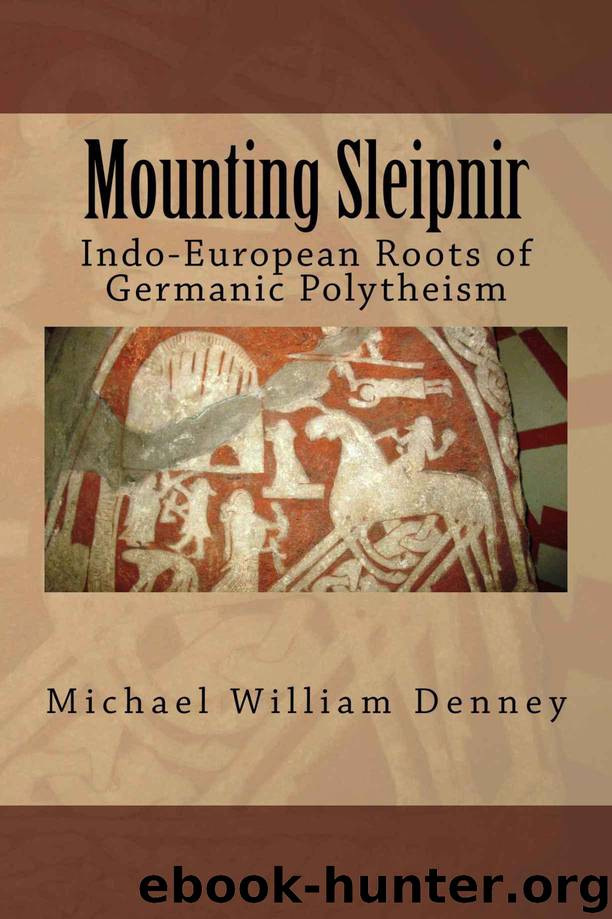Mounting Sleipnir by Denney Michael

Author:Denney, Michael [Denney, Michael]
Language: eng
Format: azw3, epub
Published: 2013-07-10T16:00:00+00:00
Loki
Loki is an extremely interesting deity who is unique to Teutonic polytheism. While most religions have some form of trickster god similar to Loki, I find Loki, as portrayed in Teutonic mythology to be a very unique and complex character.
Loki is undoubtedly the Trickster. This is the first impression one clearly gets of him. However, if someone merely goes by first impressions and simply classifies Loki as the impish trouble maker, they will miss most of what Loki accomplishes. And I believe this is by design.
Loki is actually very humble and I believe he likes to distract people with his Trickster visage in order to allow him the secrecy to accomplish his greatest works behind the scenes where no one can see him. In fact, we, the readers of the Teutonic myths are often given privileged information about who Loki really is and what he accomplishes while most of the gods are fooled into seeing Loki as merely the devious clown.
But, being the trickster that he is, no one should take Loki at face value, especially his external mask as the trouble maker.
In fact, trying to classify Loki at all is very difficult. He is directly responsible for acquiring all of the magical items possessed by all of the other gods. Notable examples are: Thunor’s Hammer, Freyja’s Flaming Gem (Brisingamen) and Woden’s magical horse “Slipper” (Sleipnir) are all directly attributable to Loki. In fact, were it not for Loki and the magical items he acquires for them, the gods would not be able to accomplish their celestial work at all.
A notable example of how Christianity has influenced modern society is how the god Loki is viewed by most modern people. He is often viewed as the Norse, pre-Christian version of the devil.
The Norse myths are very clear that Loki is directly responsible for the magical items possessed by the gods. But, because he is also portrayed at first glance as the trickster who is at odds with some of the gods, the knee jerk-reaction for many people who have been raised in a Judeo-Christian society is simply to equate Loki with evil.
I was once told a funny story about how Loki was perceived by a certain Asatru kindred. This kindred had a policy that nobody was allowed to speak Loki’s name out loud for fear that it would bring bad luck.
During one kindred gathering, a group of people were standing in a circle in a local park. One of the participants said, “Oh, the hell with it, I’m gonna say his name.” And then he shouted “Loki!”
Immediately, from behind the bushes emerged a skunk who ran into the center of the circle and sprayed everyone and then ran back into the bushes.
This experience to me sounded extremely funny. I saw it as Loki playing a prank on some Asatruers who took themselves and their theology a little too seriously.
In my opinion Loki’s message was designed to either open one’s mind to other possibilities or to confirm their limited Christianized bias of him.
Download
This site does not store any files on its server. We only index and link to content provided by other sites. Please contact the content providers to delete copyright contents if any and email us, we'll remove relevant links or contents immediately.
| Baha'i | Cults |
| Demonology & Satanism | Eckankar |
| Egyptian Book of the Dead | Freemasonry |
| Messianic Judaism | Mysticism |
| Scientology | Theism |
| Tribal & Ethnic | Unitarian Universalism |
The Four Agreements by Don Miguel Ruiz(6735)
Breaking Free by Rachel Jeffs(4214)
The Hatha Yoga Pradipika (Translated) by Svatmarama(3314)
120 Days of Sodom by Marquis de Sade(3255)
Member of the Family by Dianne Lake(2329)
The Tao of Physics by Fritjof Capra(2264)
The Psychedelic Gospels: The Secret History of Hallucinogens in Christianity by Jerry B. Brown(2148)
The Road to Jonestown by Jeff Guinn(2055)
Going Clear: Scientology, Hollywood, and the Prison of Belief by Lawrence Wright(1973)
Going Clear by Lawrence Wright(1959)
Uriel's Machine by Christopher Knight(1893)
The Grand Grimoire: The Red Dragon by Author Unknown(1800)
The Gnostic Gospel of St. Thomas by Tau Malachi(1781)
Key to the Sacred Pattern: The Untold Story of Rennes-le-Chateau by Henry Lincoln(1621)
Animal Speak by Ted Andrews(1616)
The Malloreon: Book 02 - King of the Murgos by David Eddings(1580)
Waco by David Thibodeau & Leon Whiteson & Aviva Layton(1553)
The New World Order Book by Nick Redfern(1547)
The Secret of the Temple by John Michael Greer(1485)
